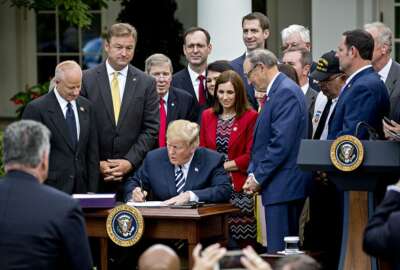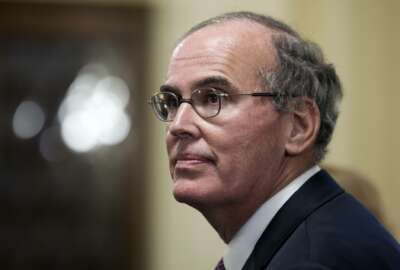

Robert Wilkie, the president's nominee for secretary of Veterans Affairs, said he would faithfully implement the VA MISSION Act, but oppose efforts to...
Best listening experience is on Chrome, Firefox or Safari. Subscribe to Federal Drive’s daily audio interviews on Apple Podcasts or PodcastOne.
President Donald Trump’s latest nominee to lead the Veterans Affairs Department pledged Wednesday that he would resist any efforts to fully privatize the department’s health care system, even as the department sets about the process of implementing a new law designed to increase veterans’ access to community-based care.
At his Senate confirmation hearing, Robert Wilkie said the VA health system must be “integrated, agile and adaptive,” but that it must continue to operate as a public-sector organization.
“[As acting secretary], I experienced what can never be duplicated in the private sector: the communal aspect of VA,” he said. “What does that mean? It means that when our veterans walk into any VA facility they converse with men and women who speak the unique language of military service.”
Wilkie faced numerous questions from senators about how he would handle any potential pressure from inside the Trump administration to further privatize VA’s health care services, considering that the previous secretary, David Shulkin, has said he believes he was fired for resisting similar pressures.
But Wilkie said there were no such pressures or preconditions attached to his nomination.
“My commitment to you is that I will oppose efforts to privatize VA,” he said.
Instead, Wilkie testified that he was committed to eliminating shortages of government employees within the department, from clinical workers to top-ranked political employees.
According to an assessment VA’s inspector general released earlier this month, an overwhelming majority of VA facilities report they are short-staffed in certain occupations. Ninety-eight percent of the 141 hospitals and clinics the OIG surveyed said they had shortages of psychiatrists. 66 percent said they needed more primary care physicians, and 58 percent reported shortages of psychologists.
And not all of the critical shortages are in clinical areas. For example, 92 percent reported high vacancy rates for human resources professionals.
“Because of the size and complexity of VA, a blunderbuss approach to filling the vacancies will not work. We have to target where VA has the greatest need,” Wilkie said. “To me, that is primary care physicians, mental health workers and medical professionals who specialize in women’s health. The second part of that would be to finally create a holistic approach to veterans care. When I visited the Small Business Administration, I was told that I was the first secretary they had seen in a long time. There are a lot of places in the federal government we can go to leverage resources to help veterans, particularly in those things that we don’t often talk about, like education, vocational rehabilitation and job training.”
But the department also faces key vacancies in its top leadership ranks. It has not had a permanent secretary since March, when Shulkin was ousted. And the positions of deputy secretary, undersecretary for health, and assistant secretary for information and technology are vacant as well.
“It’s really tough to an oversight hearing on VA right now because there’s nobody to hold accountable,” said Sen. Jon Tester (D-Mont.), the ranking Democrat on the Senate Veterans Affairs Committee.
He added that the particular vacancies were especially worrisome when it comes to VA’s implementation of a $16 billion contract with Cerner to deploy a new electronic health record, a contract Wilkie signed during his earlier tenure as the department’s acting secretary.
Wilkie said accountability for successful implementation of the EHR — and all other matters — would rest ultimately with him, if he is confirmed.
“If you can’t point to the man in charge, nobody’s in charge. So that’s me,” he said. “But I pledged to the committee that I will move as rapidly as I can to get those people in place. Dr. Carolyn Clancy is the executive in charge of VHA, and you couldn’t have anybody finer doing that. The process is moving along because of people like her. But I do pledge that I will be talking with you all about filling those jobs.”
But Wilkie did not indicate whether Clancy, a senior civilian civil servant, would be nominated as the permanent undersecretary for health, and said he had yet prepared a list of officials he would recommend to fill the department’s other vacancies.
Wilkie is expected to be easily confirmed by the Senate. After the hearing, Sen. Johnny Isakson (R-Ga.), the chairman of the committee, said he would back Wilkie’s nomination, as did Tester, who will be steering Democratic votes for Wilkie in the narrowly-divided chamber.
Wilkie served as acting VA secretary after Shulkin’s firing in March, before returning to his role as undersecretary of Defense for personnel and readiness, a post to which he was confirmed unanimously last November.
He has received mostly positive reviews from veterans’ organizations, although they stressed he had a tough job ahead in fixing VA.
“Mr. Wilkie will have to prove to millions of veterans nationwide that he is up to this mammoth, sacred leadership task,” said Paul Rieckhoff, founder and chief executive of Iraq and Afghanistan Veterans of America.”
But in what appeared to be a nod to groups such as IAVA, Wilkie acknowledged the population of veterans the department served has changed substantially in recent decades, and said the department’s service models must adapt as well.
“For the first time in 40 years, half of our veterans are under the age of 65,” he said. “Of America’s 20 million veterans, 10 percent are now women. The new generation is computer-savvy and demands 21st century service — service that is quick, diverse and close to home.”
The “close to home” aspect of VA’s mission will be delivered largely through the VA MISSION Act, which President Trump signed earlier this month. The legislation combined seven separate care-in-the-community programs into one, expanded the VA Caregiver program, set up educational services to inform veterans about their various health care options, and boosted incentives to recruit VA clinicians.
But Wilkie noted the program will take about four years to fully implement, starting with veterans who were injured prior to 1975.
“I will do my best to accelerate that, but I read a lot in the papers about this program happening overnight, and it’s a radical change for VA,” he said. “It’s still taken the Department of Defense a while to get TRICARE right. It’s much better than it was four years ago. But this is one of those programs that, we will implement and I will give it my full attention. …There are no more excuses. You have infused VA with a $200 billion budget, you have passed the Accountability Act to shake up complacency, and you have passed the MISSION Act to bring the institutional VA, community care and caregivers closer together. The future is up to the department.”
The Associated Press contributed to this report
Copyright © 2025 Federal News Network. All rights reserved. This website is not intended for users located within the European Economic Area.
Jared Serbu is deputy editor of Federal News Network and reports on the Defense Department’s contracting, legislative, workforce and IT issues.
Follow @jserbuWFED



